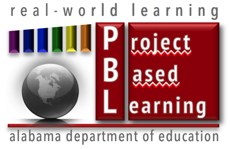Alabama lmplements Project-Based, Digital-Supported Learning
Another in an occasional series of guest posts, we are pleased to feature the work and voices of SETDA members. Today’s post comes from Dr. Shannon Parks, State Administrator for the Alabama Learning Exchange (ALEX), the state’s instructional education web portal.
The Alabama S tate Department of Education (ALSDE), Office of Educational Technology recently initiated a Project-Based Learning (PBL) Program to spark innovation, and bring job-embedded learning, deep engagement, and meaningful work into the classroom—all based upon the use of digital content aligned to College and Career-Ready Standards. After evaluating the essential components for long-term, positive change, PBL seemed the way to go.
tate Department of Education (ALSDE), Office of Educational Technology recently initiated a Project-Based Learning (PBL) Program to spark innovation, and bring job-embedded learning, deep engagement, and meaningful work into the classroom—all based upon the use of digital content aligned to College and Career-Ready Standards. After evaluating the essential components for long-term, positive change, PBL seemed the way to go.
State education leaders began the program development process by determining statewide interest in PBL. During the spring of 2013, a survey was disseminated to all districts in Alabama inquiring about the level of interest for the state to provide PBL training, digital materials, and support for districts interested in pursuing innovation in their schools. Ninety-one (91) districts responded to the survey. Of these respondents, 82% (75 districts) reported that they are interested in support for PBL in their districts. Districts varied by degree of desired implementations from grade levels in schools to entire districts wishing to implement PBL. The survey data quickly pointed out which districts were further along in their PBL implementation.
Efficacy & Cost
Rather than leaving districts on their own to develop rich materials and support for creating new environments, a cost-benefit comparison analysis quickly informed our planning team that it is much more efficacious to create and provide the best materials and training modules available centrally via the state so that districts can focus upon planning and implementing PBL.
Participating in the Buck Institute for Education (BIE) PBL Seminar in California provided the state’s staff the opportunity to gather the best resources in order to return to Alabama and build a hearty curriculum. The state plans to capitalize upon the Turn-Around Training Model, to keep cost for PBL initial pilots is minimal. During the 2013-14 school year, Baldwin County “experts” developed a three-day PBL Module, responsive to the unique needs of students, in Alabama. During the summer of 2014, another cadre of four (4) school teams were trained.
Planning at the Core
PBL necessitates an ongoing planning party! The need for a comprehensive planning tool soon emerged during the pilot phase. After a year of working on a prototype with other divisions at the state department, the ALEX team developed an online, sharable, editable PBL Unit Planning tool that incorporates all the components necessary for collaboration and success. Broad and deep collaborations with all stakeholders is a must.
Commitment=Success
Commitment is a prerequisite for effectively changing learning environments. To reinforce this concept, School Leaderships Teams (SLTs) must first apply to participate in the Alabama PBL Program. Within the application, teams commit to three (3) full days of training, and 4 days of follow-up over a two (2) year period.
Examples of required SLT commitments are:
- Application
- 3 full days of training
- Team Members Required
- school administrator
- two district administrators
- two lead teachers (one must be technology lead educator)
- Implement Turn Around Training
- school of origin plus at least one partner school (preferably feeder school)
- District Superintendent Letter of Support
- At least 75% of teachers committed
ALSDE Commitments:
- Free PBL & ACE Digital Training (Participants paid)
- Training locations at state parks
- Pre- and Post- Planning/Implementation Support
- Funding for participation
- All key materials needed to be successful
- Marketing and Public Relations support that utilizes media outlets available at the state level
Teams selected to attend are greeted at the three (3) day professional learning work session by the State Superintendent of Education who emphasizes the importance of relevancy of the PBL approach to engage students and prepare them for their futures. Further, throughout the training, technology is used to support and extend the learning. In other words, deep and relevant learning is modeled. Technology is not separate – it is part and parcel.
Resources:
- ALEX
- Dr. Bice’s PBL Welcome Video
- Decatur PBL Pilot
- PBL Pilot Video in the News (Interviews)
- PBL Pilot Pictures
- PBL Unit Lesson Plan Template
Alabama would benefit greatly from engaging with other states with statewide PBL implementations providing helpful anecdotes and successful models. Please share your adventures with our staff.
 Dr. Shannon Parks, Office of Educational Technology currently serves as the State Administrator for the Alabama Learning Exchange (ALEX), the state’s instructional education award-winning web portal. She has had many leadership opportunities to both procure and manage grants that promote the creation and use of quality P-21 digital education resources and professional learning in her state. She is inspired by the belief that digitally-based education offers a learning venue like no other. In line with this conviction, by design, all professional learning projects undertaken by the ALEX Team results in teachers and administrators creating new resources and/or project-based, digital-supported learning environments for students.
Dr. Shannon Parks, Office of Educational Technology currently serves as the State Administrator for the Alabama Learning Exchange (ALEX), the state’s instructional education award-winning web portal. She has had many leadership opportunities to both procure and manage grants that promote the creation and use of quality P-21 digital education resources and professional learning in her state. She is inspired by the belief that digitally-based education offers a learning venue like no other. In line with this conviction, by design, all professional learning projects undertaken by the ALEX Team results in teachers and administrators creating new resources and/or project-based, digital-supported learning environments for students.
